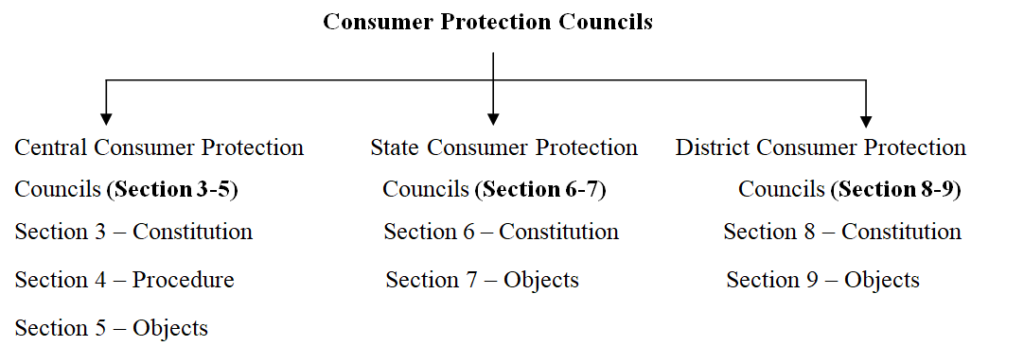Consumer Protection Councils (CPCs) are bodies or government entities formed to protect the rights and interests of consumers in a a nation. These councils are made to make sure businesses and service providers deal with customers in an ethical, responsible, and fair manner. Promoting consumer welfare, safeguarding customers from unethical commercial practises, and enhancing consumer awareness and education are the main objectives of CPCs.
Consumer Protection Councils in India work at three levels which we can easily understand by the following chart;

The Central Consumer Protection Council
Under Section 3(1) of the Consumer Protection Act, the Central Government is under statutory obligation to establish a council to be known as the Central Consumer Protection Council.
Composition – Under Section 3(2)(a) of the Consumer Protection Act, the Minister in charge of the Department of Consumer Affairs, will be the Chairperson of the Central Protection Council and in terms of Section 3(2)(b) of the Act besides the Chairperson other official or non-official members representing the field in which they have been expertise, will be nominated.
Constitution of the Central Consumer Protection Council
The Central Government shall, by notification in the Official Gazette, establish the Central Council which shall consist of the following members, not exceeding thirty-six, namely:-
(a) the Minister in-charge of Consumer Affairs in the Central Government who shall be the Chairperson of the Central Council;
(b) the Minister of State (where he is not holding independent charge) or Deputy Minister in charge of Consumer Affairs in the Central Government who shall be the Vice-Chairperson of the Central Council;
(c) the Minister in-charge of Consumer Affairs of two of the States from each region as mentioned in Schedule I to be changed by rotation on expiration of the term of the Central Council on each occasion;
(d) an administrator (whether designated as administrator or Lieutenant Governor) of a Union territory, to represent that Union territory as mentioned in Schedule II, to be changed by rotation on expiration of the term of the Central Council on each occasion;
(e) two Members of Parliament-one from the Lok Sabha and one from the Rajya Sabha;
(f) representatives of Departments of the Central Government, autonomous organisations or regulators concerned with consumer interests, not exceeding five to be nominated by the Central Government;
(g) the Chief Commissioner of the Central Consumer Protection Authority;
(h) the Registrar, National Consumer Disputes Redressal Commission, New Delhi;
(i) representatives of consumer organisations not exceeding five, to be nominated by the Central Government;
(j) representatives with proven expertise and experience who are capable of representing consumer interests, drawn from amongst consumer organisations, consumer activists, research and training organisations, academicians, farmers, trade or industry, not exceeding five, one from each of the regions specified in Schedule I, of whom at least one shall be a woman;
(k) the Secretaries in-charge of Consumer Affairs in the States, not” exceeding three, to be nominated by the Central Government;
(l) the Secretary in-charge of Consumer Affairs in the Central Government shall be the Member-Secretary of the Central Council.
Term of Central Council – The term of the Central Council shall be three years provided that the Central Council shall continue to function for a further period of three months or till it is reconstituted, whichever is earlier.
Resignation of members – Any member may, by notice in writing under his hand addressed to the Chairperson of the Central Council, resign from the Central Council.
Vacancy caused by resignation – Under Rule 5, the person appointed shall be from the same category and shall hold office only for the period of time that the original member would have been entitled to hold office had the vacancy not occurred.
Procedure for meetings of Central Council
According to Section 4(1) of the Act it is required to held every year at least one meeting of the Council. By virtue of Section 4(2) the Central Council shall meet at such time and place as the Chairperson may think fit.
Meetings of Central Council for Transaction of Business
- The meetings of the Central Council shall ordinarily be held in the National Capital Territory of Delhi or at any other place in India, wherever in the opinion of the Chairperson.
- The Chairperson, or in his absence, the Vice-Chairperson shall preside over the meetings of the Central Council, in the absence of both, the meetings of the Central Council shall be presided over by a member of the Central Council elected for this purpose.
- A meeting of the Central Council may be called with the Chairperson’s approval by sending a written notice to each member at least fifteen days before the anticipated date of the meeting through post or e-mail to facilitate speedy communication.
- The notification of each Central Council meeting should include the meeting’s time, date, and location, as well as the agenda items.
- Any business not on the agenda may be conducted at a meeting only with the consent of the Chairperson, Vice-Chairperson, or member presiding over the meeting, as applicable.
- The draft minutes of each meeting, as authorised by the Chairperson, Vice Chairperson, or member who presided over the meeting, should be given to each member of the Central Council as soon as feasible for approval at the next meeting.
- No Central Council proceedings shall be illegal only because of the presence of a vacancy or a defect in the constitutionof the Central Council.
Objects of Central Council
Section 5 of the Act prescribes the objects of the Central Council, which shall be to render advice on promotion and protection of the consumers’ rights.
Working groups –
- In order to carry out its functions under the Act, the Central Council may organise working groups from among its members to carry out tasks given to it by the Central Council.
- The Central Council should entrust to each working group clearly defined tasks which are specified through terms of reference, as well as the time-period within which such duties are to be fulfilled.
- The working groups shall report to the Chairperson ofCentral Council. The results of each working group shall be presented to the Central Council for consideration, and it shall cease to operate upon completion of the task for which it was formed.
State Consumer Protection Councils
According to Section 6 of the Consumer Protection Act, 2019 every State Government shall, by notification, establish with effect from such date as it may specify in such notification, a State Consumer Protection Council for such State to be known as the State Council.
Constitution of the State Consumer Protection Councils
The State Government shall, by notification establish the State Council which shall consist of the following members, namely:-
(a) the Minister-in-charge of Consumer Affairs in the State Government who shall be the Chairperson;
(b) such number of other official or non-official members representing such interests as may be prescribed;
(c) such number of other official or non-official members, not exceeding ten, as may be nominated by the Central Government.
By virtue of Section 6(2) the State Council shall be an advisory council.
Meetings of State Councils for Transaction of Business
Every year, the State Council must hold at least two meetings. Section 6(3) requires the State Council to meet at such time and place as the Chairperson deems appropriate, and Section 6(4) requires the Chairperson to follow such procedure in the conduct of its business as may be prescribed.
Objects of State Council
Section 7 of the Act prescribes the objects of every State Council, which shall be to render advice on promotion and protection of consumer rights within the State.
District Consumer Protection Councils
According to Section 8 of the Consumer Protection Act, 2019 every State Government shall, by notification, establish for every District with effect from such date as it may specify in such notification, a District Consumer Protection Council to be known as the District Council.
Constitution of the District Consumer Protection Councils
The State Government shall, by notification establish the District Council which shall consist of the following members, namely:-
(a) the Collector of the district, who shall be the Chairperson; and
(b) such number of other official and non-official members representing such interests as may be prescribed.
By virtue of Section 8(2) the District Council shall be an advisory council.
Meetings of District Councils for Transaction of Business
Every year, the District Council must hold at least two meetings. Section 8(3) states that the District Council shall meet at such a time and place within the district as the Chairperson deems appropriate, and shall follow the procedure established in Section 8(4) to carry out its business.
Objects of District council
Section 9 of the Act prescribes the objects of every District Council, which shall be to render advice on promotion and protection of consumer rights within the State.
Related Post | Consumer Protection Councils
1. Mention the sections of Consumer protection councils.
Consumer Protection councils have been framed under section 3 – 9 of the Consumer Protection Act, 2019 which is as follows:- 
2. What is the composition of central consumer protection council?
Under Section 3(2)(a) of the Consumer Protection Act, the Minister in charge of the Department of Consumer Affairs, will be the Chairperson of the Central Protection Council and in terms of Section 3(2)(b) of the Act besides the Chairperson other official or non-official members representing the field in which they have been expertise, will be nominated.
3. Under which section, procedure for meetings of central council is prescribed?
According to Section 4(1) of the Act it is required to held every year at least one meeting of the Council. By virtue of Section 4(2) the Central Council shall meet at such time and place as the Chairperson may think fit.
4. What is the role of working groups under central council?
Working groups –
• In order to carry out its functions under the Act, the Central Council may organise working groups from among its members to carry out tasks given to it by the Central Council.
• The Central Council should entrust to each working group clearly defined tasks which are specified through terms of reference, as well as the time-period within which such duties are to be fulfilled.
• The working groups shall report to the Chairperson ofCentral Council. The results of each working group shall be presented to the Central Council for consideration, and it shall cease to operate upon completion of the task for which it was formed.
5. What is the composition of State consumer protection council?
The State Government shall, by notification establish the State Council which shall consist of the following members, namely:-
(a) the Minister-in-charge of Consumer Affairs in the State Government who shall be the Chairperson;
(b) such number of other official or non-official members representing such interests as may be prescribed;
(c) such number of other official or non-official members, not exceeding ten, as may be nominated by the Central Government.
6. What is the object of state council under Consumer Protection Act?
Section 7 of the Act prescribes the objects of every State Council, which shall be to render advice on promotion and protection of consumer rights within the State.
7. What is the composition of District consumer protection council? Consumer Protection Councils
The State Government shall, by notification establish the District Council which shall consist of the following members, namely:-
(a) the Collector of the district, who shall be the Chairperson; and
(b) such number of other official and non-official members representing such interests as may be prescribed.
8. What is the object of District council under Consumer Protection Act?Consumer Protection Councils
Section 9 of the Act prescribes the objects of every District Council, which shall be to render advice on promotion and protection of consumer rights within the State.
Reference Books | Consumer Protection Councils
- Commentary on the Consumer Protection Act by J. N. Barowalia
- Consumer Protection Act: A Commentary by G. B. Reddy
- Consumer Protection (Law & Practice) by V. K. Agarwal

















